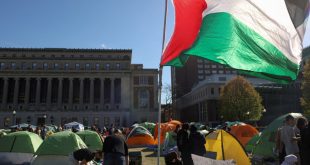As the Gaza war rages, with civilian deaths soaring, few Arab leaders have publicly voiced their visions for the future of the battered enclave, fearing they will be accused of endorsing Israel’s actions.
But one influential Palestinian exile, in an interview with The New York Times, has provided public insight into the types of postwar plans that Arab leaders are privately discussing.
Mohammed Dahlan, an adviser to the president of the United Arab Emirates, outlined one under which Israel and Hamas would hand power to a new and independent Palestinian leader who could rebuild Gaza under the protection of an Arab peacekeeping force.
While such plans face steep challenges, the leaders of Egypt, Saudi Arabia and the Emirates are open to supporting processes that are part of efforts leading to a Palestinian state, said Mr. Dahlan, who also has close ties to Egypt’s president, Abdel Fattah el-Sisi.
Officials from six Arab governments gathered in Saudi Arabia last week to discuss the future of Gaza and the need for a cease-fire, according to two Palestinian officials, who spoke on the condition of anonymity.
Under the plan outlined by Mr. Dahlan and echoed privately by Arab nations, a new Palestinian leader would assume responsibility for Gaza and the parts of the Israeli-occupied West Bank currently administered by the Palestinian Authority. That leader would replace Mahmoud Abbas, the authority’s 88-year-old president, who would retain a ceremonial role, Mr. Dahlan said.
“No Abbas, no Hamas,” said Mr. Dahlan, who has long been at odds with Mr. Abbas. “New people in charge of the Palestinian Authority.”
For years, Mr. Dahlan was isolated from the Palestinian political scene, and criticized by many power players.
He was Mr. Abbas’s national security adviser when Hamas took over Gaza in 2007, and he had a reputation for brutality that made him unpopular with many Palestinians. His relationship with Mr. Abbas deteriorated amid perceptions that he was trying to succeed him, and he was convicted of corruption in absentia, on charges he denies, in 2016.
In the U.A.E., he built close relationships with members of the royal family, initially reconnecting with Sheikh Hazza bin Zayed, his former counterpart in the Emirati security establishment. He also connected with Sheikh Hazza’s brother, Sheikh Mohammed bin Zayed, who became president in 2022. Mr. Dahlan has since become one of his key advisers.
“He’s very much the Emirati president’s point man on Palestinian policy,” Mouin Rabbani, a Palestinian politics expert, said of Mr. Dahlan.
Mr. Dahlan still has critics who say that he used heavy-handed tactics in Gaza, and that he had a tendency for self-promotion. But he is a significant force in Palestinian politics, analysts say, partly the result of his helping to steer Emirati funds to Gaza.
He oversees a political party that was seen as a possible kingmaker during a 2021 election campaign in the West Bank and Gaza, before the vote was canceled. He coordinates regularly with other Palestinian opposition leaders in a loose network seeking to unseat Mr. Abbas.
“He’s a prominent Palestinian politician with a wide network of support in Gaza,” said Jehad Harb, an analyst based in Ramallah, in the West Bank. “The millions the Emirates has funneled to Gaza through him has only reinforced his standing there.”
Mr. Dahlan also has built close ties with top Hamas officials in recent years, according to Ghaith al-Omari, an analyst of Palestinian affairs at the Washington Institute for Near East Policy.
In the interview, Mr. Dahlan, 62, said a new Palestinian administration could invite friendly Arab states to send troops to help keep order in Gaza. And countries like the U.A.E. and Saudi Arabia would be prepared to help — and to fund reconstruction — if Israel agreed to the creation of a Palestinian state, he said.
“If there is a two-state solution, the answer is a big yes,” Mr. Dahlan said.
“The main Arab countries are really very keen to settle this conflict,” he added. “Not the war, the whole conflict.”
Saudi Arabia and Egypt declined to comment on the plan described by Mr. Dahlan. A U.A.E. statement did not directly address the plan, but said, “Our contribution to any reconstruction effort in Gaza will be conditional” on commitments toward achieving “a two-state solution.”
Briefed on the plan that Mr. Dahlan described, Abdulkhaleq Abdulla, an Emirati political scientist, said it was “consistent with what we know about what we call ‘the day after’” the war, referring to what he had been hearing about discussions among Arab leaders.
The plan faces considerable hurdles. The Palestinian Authority and Mr. Abbas have balked at changes to the organization, which remains mired in corruption and is widely seen as authoritarian.
Prime Minister Benjamin Netanyahu of Israel has pledged to retain “overall security” control over Gaza and the West Bank, rejecting a fully sovereign Palestinian state. Mr. Netanyahu’s political base is also pushing to resettle Israeli civilians inside Gaza once the war ends.
Any proposal would also require buy-in from Hamas, which still controls part of southern Gaza.
The situation in Gaza is dire: An estimated 28,000 people have been killed; most buildings are damaged or destroyed, according to the United Nations; and most of the 2.2 million residents have fled their homes.
Mr. Dahlan said that some of his family had been killed in Gaza and that many of their homes had been destroyed.
Mr. Dahlan grew up in southern Gaza, in the same city as Yahya Sinwar, the Hamas leader who oversaw the Oct. 7 attack on Israel.
Mr. Dahlan joined Fatah, Hamas’s secular rival, and rose to become the Palestinian Authority’s security chief in Gaza. He was traveling outside Gaza when Hamas seized control of it in 2007, stripping him of his power and prompting his flight to the West Bank. Four years later, Mr. Dahlan fell out with Mr. Abbas. After he was ousted from Fatah and Palestinian security forces raided his home in Ramallah, he fled.
In exile, Mr. Dahlan accrued power, wealth and influence through his close friendship with the Emirati president, whom he represents as an emissary throughout the region.
The signs of his comfortable position in Abu Dhabi were apparent during the interview, which took place inside the grounds of a palace owned by the Emirati royal family. Outside his office stood a chrome-colored Bentley; in his sitting room were at least 12 large sofas.
Though once seen by some Israelis as a potential partner, Mr. Dahlan showed little sympathy for Israeli concerns in the interview. He dismissed the idea of him trying to convince Israelis about the need for a Palestinian state. “It’s not my job to convince the Israelis,” he said. “Let them go to hell.”
Mr. Dahlan said he was working to convince Hamas to cede power to a new Palestinian leadership, hinting that the group could be persuaded to give up control as part of a broader package that created a Palestinian state.
For a decade, Mr. Dahlan has been widely considered a possible successor to Mr. Abbas. But in the interview, he said he was uninterested in taking on a formal leadership role.
Mr. Dahlan is unlikely to be in a rush to leave the U.A.E. in order to lead a complicated reconstruction process in a rancorous political system, Mr. Omari said. Still, he has spent considerable time and money maintaining networks in the West Bank and Gaza, suggesting he has long-term political aspirations, Mr. Omari said.
“He’s not someone who has checked out of Palestine,” he said.
Like other senior Palestinian politicians, Mr. Dahlan shied away from condemning the Hamas-led attack, in which Israeli officials say about 1,200 people were killed.
But he criticized Hamas leaders for claiming that Gazans were ready to pay the price of the group’s actions.
“Relying on people suffering isn’t leadership,” he said. “The Palestinian people want to live.”
 Top Naija News: Nigerian News, Breaking News Nigeria and World News Top Naija News is a daily news publication in Nigeria, delivering the latest breaking news in Nigeria and around the world.
Top Naija News: Nigerian News, Breaking News Nigeria and World News Top Naija News is a daily news publication in Nigeria, delivering the latest breaking news in Nigeria and around the world.


